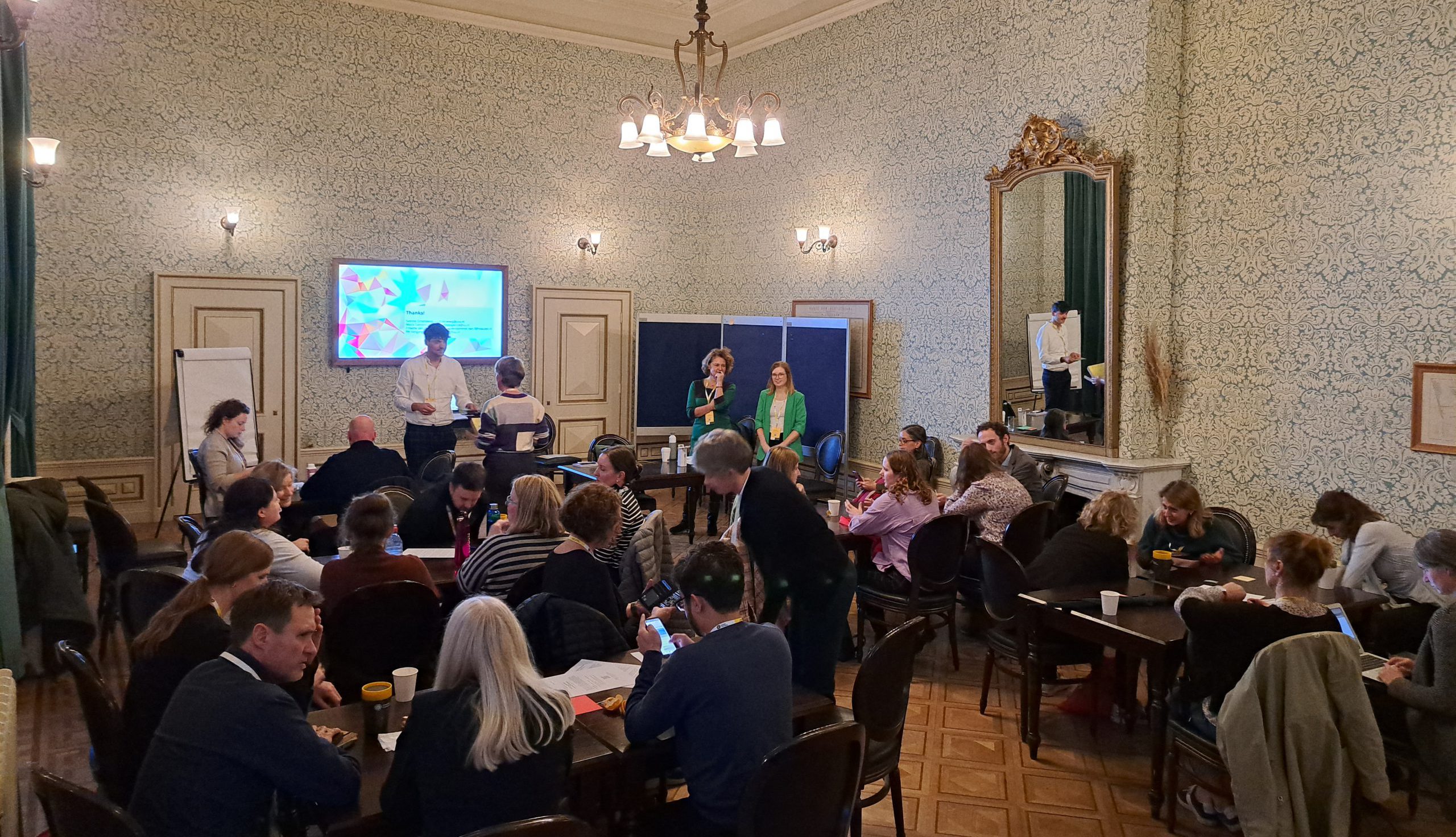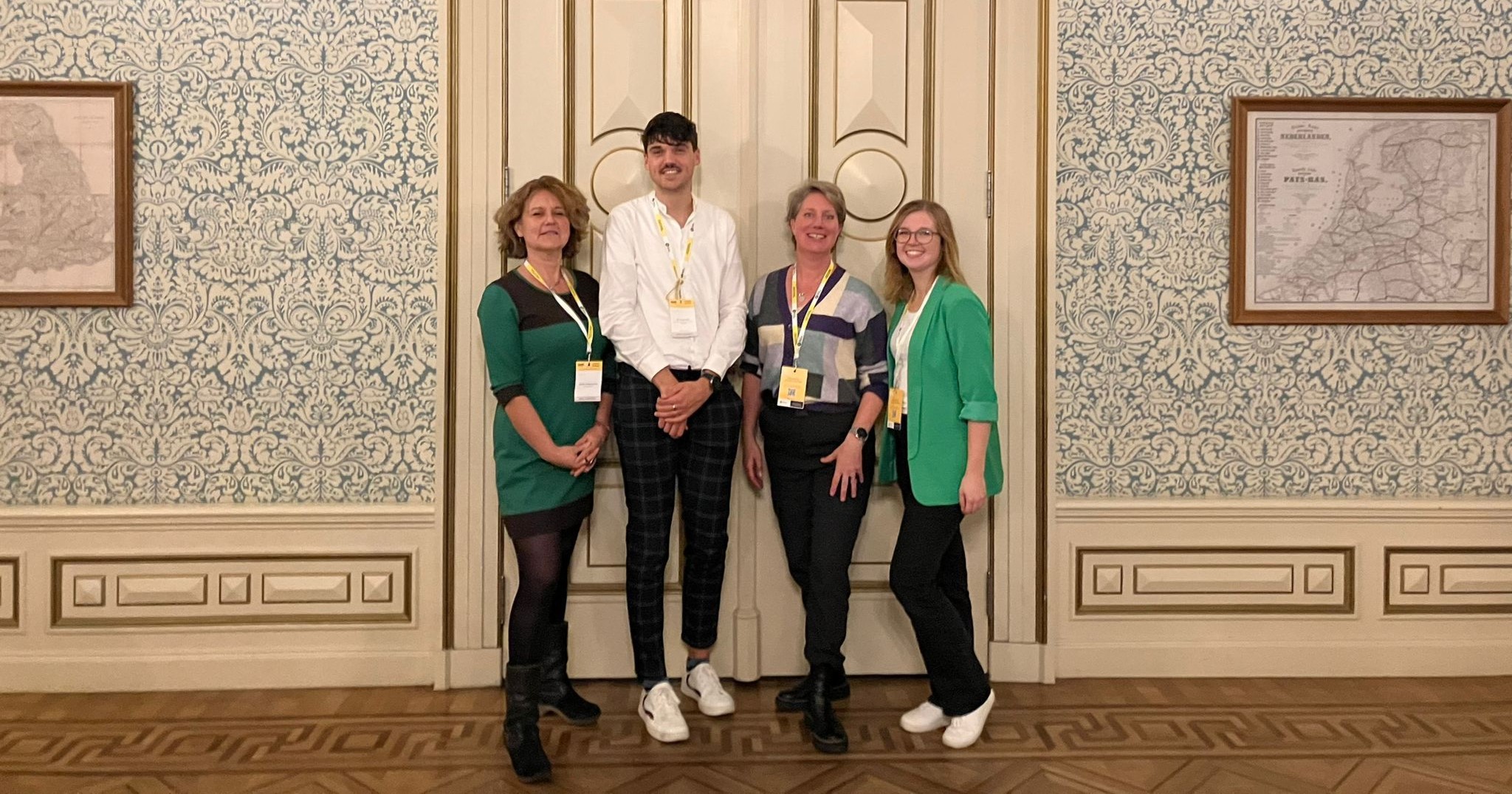
Recap: ISSOTL conference with UvA TLC researcher Svenne Groeneweg
From 8 to 11 November 2023, the ISSOTL conference took place at the Railway Museum in Utrecht. Hundreds of academics from all over the world gathered to discuss Scholarship of Teaching and Learning (SoTL). UvA TLC researcher Svenne Groeneweg along with three other panellists from different higher education institutions hosted a session here to discuss the various SoTL programmes. How did the session unfold? What were the main takeaways? And what exactly does SoTL entail? You’ll find out in this article.
What exactly does SoTL entail?
SoTL stands for Scholarship of Teaching and Learning. We speak of SoTL when teachers conduct systematic research into their own educational practices. The objectives are to improve both teaching and learning and to share insights with the academic community.
A characteristic of SoTL is that the research is conducted by teachers themselves and not by external educational scientists. The research question therefore always stems from the teachers’ own teaching practice.
In addition, SoTL is a research-based approach to educational improvement. It extends beyond critical reflection. In fact, teachers go through the entire research cycle, including data collection, data analysis and dissemination.
And finally, SoTL is about sharing results. By doing so, teachers not only improve their own education but also enrich the existing knowledge about education. For instance, insights from SoTL research can serve as a basis for new research and as inspiration for other teachers.
How did the session unfold?
The session, like the rest of the conference, took place at the Railway Museum. The museum comprises some beautiful historic halls, richly decorated with old train carriages, and thus cannot be described as a standard academic environment. “During all the sessions, you sit among the old train carriages and sometimes even inside of them. And actually this environment greatly stimulated creativity,” Svenne tells us. The session, which Svenne organised with the other panellists, unfortunately did not take place in one of the train carriages, but rather in one of the beautiful antique waiting rooms. Here, dozens of people had gathered to discuss the role of SoTL within Dutch higher education.
The full panel consisted of: Frowine den Oudendammer from Hogeschool Leiden (HL), Maiza Campos Ponce from the Vrije Universiteit (VU), Rik Vangangelt from Utrecht University (UU) and our own TLC researcher Svenne Groeneweg from the UvA. They were all given the opportunity to pitch their university’s vision on SoTL in two minutes. This was followed by the interactive part of the session, where all attendees were given the opportunity to vote on various relevant propositions with green and red cards. After voting on the propositions, an open discussion also took place in which everyone could participate.


How did the panel evaluate the session?
The panel members are excited about the format and proceedings of the session. “Many panel discussions are quite static; the panellists give their opinions and engage with each other. We were very eager to continue this conversation with the participants, which is why we opted for an interactive format. The audience had the opportunity to engage in debate with us, both them and us sharing opinions and perspectives,” explains Rik (UU). Maiza (VU) agrees: “I think our panel discussion was very dynamic, with a lot of room for not just our input, but specifically for contributions from the participants. The audience apparently felt this too because they participated perfectly. “
The interscolary session that included dedicated cooperation between different higher education institutions has thus been well received. However, such cooperation is by no means a given in higher education, where many institutions normally operate from within their own expertise. As such, sometimes an ‘insular culture’ remains. Nevertheless, the different institutions increasingly succeed in reaching each other. And that certainly pleases the panel members, mentions Rik (UU): “I really like the fact that four higher education institutions, each with their own character, are collaborating on the same subject. I don’t sense any competition, but instead, I feel a willingness to share ideas and experiences, because we share the same goal: better education.” “After our session, several people came up to us eager to remain in touch and/or to ‘join our group’. Something I really appreciate about our collaboration is that we are all committed to promoting SoTL at our institutions. We all approach this from a different angle and that makes it very enlightening to engage with each other,” concludes Svenne (UvA).
Svenne (UvA): “Within the UvA, for example, the SoTL approach is manifested in the Education Research Fellows Programme. Within this fellowship, teachers are granted, one day a week for a period of two years, to design and implement their own SoTL project. There is an annual symposium where they can present their progress and results. Although teachers do set up and conduct research in the process, SoTL research should not be reviewed within the same assessment frameworks as traditional, disciplinary research. Because SoTL research concerns the teacher’s own education, the context, methodological approach, and dissemination strategy of this type of research differs from traditional research. The primary objective is to gain further insights into teaching and learning and to share these insights within the community to improve the education given. It should therefore also be recognised and valued within the career path and not just that of research.”
Rik (UU): “The discussion in the session fuelled my thinking. An alternative career path can help put SoTL on the map, to show that we understand something completely different about teaching in an academic way than teaching in an ‘ordinary’ way. Ultimately, you want an institution’s promotion policy to accommodate diverse academic careers – including those in academic teaching – rather than having a separate label for it.”
Svenne (UvA): “It appears to be much easier for experienced teachers to integrate their SoTL projects into their programme or department, which means they receive more support. As a result, their projects seem more likely to deliver sustainable educational development. However, during our session, the audience emphasised the added value of young SoTL teachers. For instance, they might have new perspectives on education and could ask questions that more experienced teachers are less likely to consider. For example, starting teachers may be quicker to assess conventional preconceptions about education and perhaps contribute more innovative ideas.”
Maiza (VU): “I think young teachers must engage with SoTL. In fact, at the VU, we notice junior teachers (young D4 teachers) are particularly adept at designing and implementing educational innovations. They are often closer to students, for example, and listen carefully to the needs of students. As such, they don’t become discouraged by those preconceptions and are less apprehensive about implementing innovations.”
Frowine (HL): “It’s not just educational experience that matters, it’s also about a teacher’s ability to initiate and -deploy the necessary changes.”
Rik (UU): “I hope we will have SoTL teachers across all disciplines in the future, and that it will be a mix of junior and senior teachers.”
Rik (UU): “My PhD research shows that networking is one of the most important elements Within SoTL teaching. You learn from colleagues with more experience on a specific SoTL piece, you feel supported when you see others struggling with the same challenges as you. A network includes academics who can be inspiring role models. I also observed how valuable it can be when teachers from different higher education institutions are able to interact with each other. Last year, teachers from Leiden University of Applied Sciences presented their SoTL projects at our annual Education Festival and entered into a dialogue with UU teachers about their projects. It’s wonderful how we can learn from each other this way.”
Svenne (UvA): “Within the fellowship at the UvA, community-building plays an increasingly important role. We noticed that the group meetings were considered to be highly stimulating. The interdisciplinary character in particular was appreciated here, and teachers from every faculty participated. The participants were introduced to people inside and outside the UvA whom they would never have encountered without the fellowship. This almost always led to interesting and inspiring conversations, but sometimes also to new collaborations and projects. The importance of networking became very clear to us. With the new group, which started in September 2023, we are actively trying to extend and strengthen the networks of our participants.”
Frowine (HL): “We do find that investing in community-building really requires attention, simply organising meetings is not enough. You really have to facilitate interaction between teachers in different ways. After this, you will see that they are open to ideas and feedback from others. And that they also tend to find each other outside the organised occasions.”
Maiza (VU): “At the VU, we specifically formulated community-building as an objective within the SoTL programme. The SoTL community subsequently has to contribute to a broader culture where teachers are encouraged to innovate and research their teaching.”
Svenne (UvA): “At the UvA, we could learn a lot from the best practices of UU, VU and HL. Therefore, collaboration and community-building must extend beyond our own university. This way, we can really unite the different islands and I hope SoTL will gain further recognition then.”
Rik (UU): “I hope we can continue to exchange expertise about supporting SoTL together. As colleagues, we take glimpses into each other’s kitchens and this is extremely valuable for the development of SoTL.”
Frowine (HL): “There is a need to learn with- and from each other about how institutions organise SoTL internally. The first desires for a learning network, including institutions from MBO, HBO and WO, have been articulated. It is really interesting how we as a higher education institution are developing to focus more on research in addition to education. While universities sometimes shift their focus back to education. We really have a lot to offer each other in this respect.”
Maiza (VU): “I really hope that this is the beginning of a Dutch SoTL partnership where we can learn from all the educational innovations and research on SoTL!”





